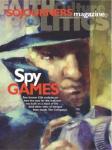Folk singer-songwriter Richard Shindell is a trained observer. He has just finished playing in a "Study War No More" roundtable at the Falcon Ridge Folk Festival in Hillsdale, New York. Seated in the grass between two parked cars at the end of a sparkling sunny day, he spoke about songwriting, faith, and why not every folk song about war should be an "anthem."
As he spoke, going through a few cigarettes, one could almost imagine the characters from his songs listening attentively. There would be a tire-changing nun over here, a nasty immigration officer over there, Mary Magdalene over there, an angry abandoned lover just yonder. But with his three children off to buy snacks and play on the hillside, the 43-year-old artist smiles self-deprecatingly as he reflects on the workshop, which included folk legends Holly Near, the Kennedys, Tracy Grammer, and Tom Paxton.
"I was like, ‘God, what am I doing here?' I just felt like an alien," he said, because his songs are less about concepts like freedom or peace or cooperation and more about people like war widows, army couriers, and young frightened soldiers. Sitting up there on stage comparing himself to the others, many of whom got excited ovations and prompted the formation of a "human peace sign" on the hill, Shindell realized he's simply a different type of songwriter.
"In a way I felt like, ‘Gee, I should write some more rousing anti-war songs that will make people want to beat their swords into plowshares and start a revolution.' And I wish I could. I really do. But I'm just not good at it. And that's fine. There are people who are better at it than I am."
Instead of the anthems, Shindell tells stories, which he said makes his music a different type of "protest" form. "It strikes me as important and useful to make as concrete as possible how things like war affect individuals," he said about the song "Reunion Hill," which describes a woman who loses her husband in the Civil War. "You know, just paint the picture as concretely as you can."
Shindell, a New Jersey native who currently lives in Buenos Aires, Argentina, made his debut on the folk scene in 1992 with Sparrow's Point, the first of his four studio albums. He followed up with Blue Divide (1994), Reunion Hill (1997), and his 2000 release, Somewhere Near Patterson. In 1998, he participated in the folk super-group Cry, Cry, Cry, a trio with Lucy Kaplansky and Dar Williams, and released a self-titled album of mostly cover songs. His live album Courier hit the streets in 2001, garnering high praise, and he expects to release his next studio album, tentatively titled So Says the Whippoorwill, in February.
Shindell's songs have in common a devotion to the craft of storytelling; what makes him unusual among folk artists is that few of his songs are about things that have actually happened to him. Instead, he creates characters that are round and real, and like a piece of good short fiction, he takes an emotional journey through his creations' eyes.
This issue of telling stories about individuals is the very reason Shindell never became a priest—or is even sure if he officially earned his degree—after three years of study at Union Theological Seminary. When he entered the seminary in 1986, Shindell, an Episcopalian, considered himself "a free radical," unsure about ordination but hoping to combine his passion for religious studies with work as a psychotherapist. But in a hymn-writing class—just before Shindell stopped doing much homework as he became entrenched in songwriting—it came to him that his calling was different.
He had written a hymn, which today he can't remember, and submitted it to the professor. She told him it was a very nice song, but it wasn't a hymn. Why, he asked? "‘Because it does not speak to a community. It is too'—I don't think she used the word subjective but I think that is what she meant—it was too ‘individual.' In other words, it wasn't the sort of song that people could sing together as a common affirmation," he recalled.
SHINDELL MAY NOT be a priest, but he's definitely hungry for spirituality. The self-described "seeker," who says he doesn't attend church regularly, is hard to pin down. He's been identified as a "misanthropic, ex-seminarian, lapsed Buddhist, agnostic for Jesus," a quote he says is mostly true, except for the "misanthropic" part. "Sometimes I am an atheist. Sometimes I am agnostic. And sometimes I am a Christian. It really depends," he said.
His songs reflect his spiritual questing, from the mystical "On a Sea of Fleur-de-Lis" to the brave and beautiful "Before You Go," which is written in God's voice, speaking to Jesus before he is incarnated on earth.
If Shindell is on a spiritual journey, replete with a meditation practice and readings from writers including Thomas Merton, St. John of the Cross, and John Donne, he also journeys with the process of crafting each of his songs. "It is like walking into a dark forest and you don't have a flashlight. You have no idea where it is going," he said, but "every time it happens, it is like you are walking into a different wood, and the stumps you're going to trip over are in different places."
While the process of songwriting "never gets any easier," Shindell said that the key element required to pursue a song through the wilderness is faith. "You have to have faith that somehow you are doing something,
you are going through some process of finding something in the dark woods," he said. "You just have to have faith that you are going to walk into those woods and something is going to come out, and it might actually mean something to somebody."
Holly Lebowitz Rossi is a free-lance writer living in Arlington, Massachusetts.

Got something to say about what you're reading? We value your feedback!